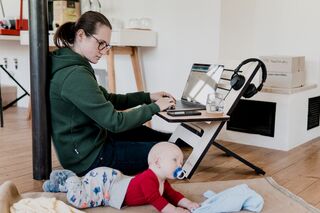Aging
Millennial Moms Are Emotionally Exhausted
There's a hole in the workforce where driven women used to be. We're tired.
Posted May 26, 2021 Reviewed by Jessica Schrader
Key points
- The U.S. economy has not bounced back the way analysts expected. Many women left the workforce and have not returned at the same rate.
- Millennial moms have been particularly strained by the pandemic with child care issues and virtual schooling demands.
- Millennial moms are at a inflection point no other generation has faced.
It was recently reported that the road to economic recovery has been disappointing. U.S. employers added 266,000 jobs in April—dramatically fewer than the nearly 1 million analysts expected.
A key theme emerging in discussions about the economic bounce back is the need for women to get back to work.

In an NPR interview, Labor Secretary Marty Walsh said the recovery hinges on women returning to work. "We need to make sure if we're going to have a strong recovery—a strong, equitable recovery—we need to get women back into the workforce."
What analysts and economists (all male-dominated fields in my review of the research) fail to ascertain, is that women may not want to return to the workforce. Women, and millennial moms in particular, are emotionally exhausted.
The pandemic was a traumatizing experience that forced women to add to their already overloaded plates. I believe that many millennial moms have realized that they need to reimagine what work looks for them.
For many women, things are not as simple as going "back into the workforce." If the Labor secretary really wants to know why women aren't returning to the workforce the answer is this: Women are depleted and under-nurtured.
Here's my examination into why millennial moms are in crisis, and why the pandemic may have completely changed the course of their career paths.
Millennials are having children later
For many reasons, all of which are no one's business, millennial women are choosing to have children later in life. The choice to delay having children can contribute to issues with fertility; I speak from experience. Contrary to other countries, where fertility medical coverage is a given, in America, women are left in the trenches fighting for incredibly expensive and gut-wrenchingly unpredictable care.
Maternity leave is laughable in America
If we are blessed to conceive, we have to manage morning sickness and morning meetings simultaneously, trying to find a way to create a "seamless transition" for our boss while we are out for a tight three months. We certainly would not want our boss to feel any sort of inconvenience. For many women, a paid maternity leave is still a luxury far out of reach. It's no wonder women dread returning to work after time off.
Motherhood is a savage sport
In the world of Pinterest and Instagram, it's never been harder to be a mom. Perfectionism has reached new heights. June Cleaver would be eating her heart out at the drool-worthy recipes on social media and the filtered lives of family influencers. Moms everywhere feel inadequate because social media feels like a requirement, not recreation.
Home life is still not equitable
While women are achieving more than ever before at work, we're still doing the same amount of work at home. Men aren't stepping up in a commensurate way, which means moms are burned out from late-night laundry, PowerPoint presentations, and bedtime routines.
Millennial moms are caring for babies and aging parents at the same time
One of the most poignant reasons millennial moms are emotionally exhausted is because their mothers also need them. Millennial moms must contend with the common scenario of having babies while their own mothers enter their aging years. Not only are they caring for a newborn, but they are also beginning to nurture their own mothers.
If it's true that our economy is frail without women, then we need to see action. To incentivize driven women to reenter the workforce we need to be paid equitably. We need child care, fertility benefits, flexibility, and respect.


